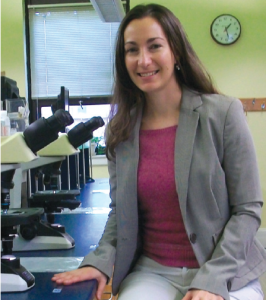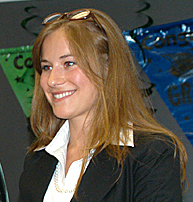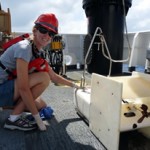 KESTREL PEREZ graduated in 2011 with her PhD in marine and atmospheric sciences. Under
the advisement of Professor Stephan Munch, Kestrel’s dissertation examined the evolution
of size in fish and evaluated the strength of natural selection and the presence of
prolonged trade-offs from an early period of fast growth to better understand the
evolution of size. She joined the School of Marine and Atmospheric Sciences in 2005
as a scholar in the Alliance for Graduate Education and the Professoriate, and is
a recipient of the Dr. W. Burghardt Turner Fellowship. Upon completing her PhD, Kestrel
went on to a postdoctoral position at the University of Texas at Austin in the Department
of Marine Sciences.
KESTREL PEREZ graduated in 2011 with her PhD in marine and atmospheric sciences. Under
the advisement of Professor Stephan Munch, Kestrel’s dissertation examined the evolution
of size in fish and evaluated the strength of natural selection and the presence of
prolonged trade-offs from an early period of fast growth to better understand the
evolution of size. She joined the School of Marine and Atmospheric Sciences in 2005
as a scholar in the Alliance for Graduate Education and the Professoriate, and is
a recipient of the Dr. W. Burghardt Turner Fellowship. Upon completing her PhD, Kestrel
went on to a postdoctoral position at the University of Texas at Austin in the Department
of Marine Sciences.
Kestrel is an assistant professor of biology at St. Joseph’s College in Brooklyn,
N.Y., where she is teaching courses in marine biology and evolution and ecology, and
mentoring undergrad researchers. Her research centers on marine biology. Specifically,
she focuses on fish and invertebrate evolutionary ecology, the study of life history
traits and maternal investments, and how variation in these areas influences larval
fitness and recruitment.
 Helen Cheng was the first recipient of the Stony Brook Mote Marine Laboratory Internship. She graduated with a B.S. in Biology and a minor in Marine Sciences in 2009. She is now at the Science and Resilience Institute at Jamaica Bay (SRIJB).
A recent spotlight highlighted her background
Helen Cheng was the first recipient of the Stony Brook Mote Marine Laboratory Internship. She graduated with a B.S. in Biology and a minor in Marine Sciences in 2009. She is now at the Science and Resilience Institute at Jamaica Bay (SRIJB).
A recent spotlight highlighted her background
From Spotlight on Helen Cheng at the Science and Resilience Institute at Jamaica Bay
The Science and Resilience Institute at Jamaica Bay (SRIJB) and New York Sea Grant
are happy to announce the arrival of Helen Cheng as the Specialist for the New York
Sea Grant’s Jamaica Bay Coastal Resilience. Helen will be designing outreach programs
to support community engagement and research efforts to enhance resilience for the
communities within the Jamaica Bay Watershed.
“Urban areas are getting more attention, especially since the devastation caused by
Superstorm Sandy,” Cheng said. “Resilience is a priority across the national network
of Sea Grant programs, and Jamaica Bay is internationally important setting for the
issue.”
Cheng comes to SRJIB from a yearlong stint as a John D. Knauss 2015 Marine Policy
Fellow at the National Oceanic and Atmospheric Administration (NOAA) Sea Grant, a
highly competitive fellowship program among the nation’s highest qualified graduate
students. She was the Coastal Communities Specialist working in the National Sea
Grant Office in Silver Spring, Maryland, where she synthesized Sea Grant Network research
and extension activities surrounding coastal community sustainable development, hazard
resilience, and climate change adaptation. She was on the NOAA Coastal Hazards Resilience
Workshop Planning and Support team, and assessed institutional and network research
portfolios from the 33 programs of the Sea Grant Network to help identify priorities
of the National Sea Grant College Program.
Helen was selected a Knauss Fellow from the New Hampshire Sea Grant program. At the
University of New Hampshire she earned her M.S. in Zoology with her research on horseshoe
crabs. In New England, she also worked with lobsters and scallops, was a UNH teaching
assistant, and a naturalist at the nearby Seacoast Science Center. Helen earned her
B.S. in Biology from Stony Brook University in 2009 where she was selected for the
first-ever Stony Brook Mote Marine Laboratory internship.

Did you check the weather report today? Then you probably know Katherine Rojowsky’s
work. Katherine, an Atmospheric and Oceanic Sciences major, credits “amazing internships”
with helping her mature as a meteorologist.
At WCBS-TV, Katherine prepared weather graphics and forecasts that were broadcast
to millions of viewers and used by the Weather Channel. Private forecasting companies
MetroWeather and Weather 2000 Inc. asked her to make weather predictions used by film
and television production companies, golf courses, and local sports teams like the
Mets and Long Island Ducks.
“I thought that being at SoMAS would help get me places, and I was right,” Katherine
says. “I’ve already succeeded beyond my wildest dreams.”
 Jae Lee received both her PhD and MS from SoMAS, graduating in 2008. For her master’s
thesis, Jae looked at radiative transfer modeling with Professor Bob Cess to estimate
the earth’s radiation balance. Her PhD conducted under the direction of Professor
Sultan Hameed focused on how the sun can influence Earth’s climate.
Jae Lee received both her PhD and MS from SoMAS, graduating in 2008. For her master’s
thesis, Jae looked at radiative transfer modeling with Professor Bob Cess to estimate
the earth’s radiation balance. Her PhD conducted under the direction of Professor
Sultan Hameed focused on how the sun can influence Earth’s climate.
Jae recalls “Stony Brook offered her a very good education. I learned everything I
should know for my job at Stony Brook.”
Jae is currently a research scientist at the University of Maryland, Baltimore County,
working at the NASA Goddard Space Flight Center. She is working on satellite mission
for solar irradiance measurements and analyzing satellite data to determine solar
variability and its impact on Earth’s climate. She is also “interested in arctic
environment changes related with recent Greenland Ice Sheet losses.”
Jae’s advice to SoMAS students is to “Work and work, enjoy, be yourself; opportunities
will come.”

Lora Clarke received her Ph.D. from SoMAS in 2007. She also has a Bachelor of Science
degree from Christopher Newport University in Virginia and a Master of Science from
the University of Massachusetts. At SoMAS, she worked with former Dean David Conover
on numerous fish ecology studies involving Atlantic silversides, Menidia menidia.
Lora’s research concentrated on the population dynamics and connectivity of subpopulations
of this species along the east coast of the United States.
After she graduated, Lora was awarded a prestigious John A. Knauss Marine Policy Fellowship
by NOAA in 2008 and began working with the NOAA Fisheries Office of Science and Technology
in Silver Spring, Maryland, where she served as the Ecosystems Project Coordinator.
Her duties included assisting Dr. Steve Murawski, then NOAA’s Chief Scientist and
Head of Scientific Programs, on programs related to ecosystem-based management. She
also prepared international policy briefs and reports for Congress and helped administer
CAMEO (Comparative Analysis of Marine Ecosystem Organization) – a new grant program
co-sponsored by NOAA and the National Science Foundation.
After her one year fellowship ended, Lora was hired to stay on at NOAA to work on
CAMEO. Currently, Lora develops goals and priorities for interdisciplinary ecosystem
research, coordinates scientific review of research proposals and creates outreach
plans to help promote the CAMEO program. In addition, Lora works with JSOST, the Joint
Subcommittee for Ocean Science and Technology. JSOST is a group of 25 federal agencies
organized under the White House Office of Science and Technology Policy that sets
the national priorities for ocean science and technology research. Lora is one of
two executive secretaries for the group.
Lora reflects on her SoMAS years…“The interdisciplinary nature of my education at
SoMAS helped to prepare me for the work I am doing now and has helped to shape my
career path. The breadth of courses, field work and lab experiences provided me with
a strong well-rounded background in marine science and has allowed me to have the
flexibility to pursue a career in science administration and policy. Working in internationally
famous laboratories exposed me to leaders in the field and I was impressed by the
willingness of faculty and students to collaborate with each other. This has helped
me to successfully tackle the variety of marine ecosystem issues that I face in my
job today. I am extremely thankful for my time at SoMAS.”

“Being in Stony Brook University gave me the opportunity to experience what it means
to be a marine biologist and I am thankful I have been a part of MSRC. The Marine
Sciences Research Center is full of faculty who are supportive and always willing
to help. I will always remember as I was applying to graduate school, all the faculty
who were willing to talk to me and give me advice even though I was never one of their
students and they were not my assigned advisors. Having had a mentor like Bassem Allam
has really helped me become who I am today. He was supportive, helpful, and taught
me how to become a better scientist. With him as my mentor, I was able to do a URECA
summer project, present a poster at the URECA poster presentation event, as well as
learn numerous lab skills. As I continue my studies in marine science, I can only
hope that one day I will become a professor who like Mary Scranton, is always willing
to take time out to advise students, who like Bassem Allam, inspires students to pursue
marine science and instills confidence in students to think for themselves, and like
all the faculty at marine science, who always keep an open door and a willingness
to help every student.”
 “I was very happy with my decision to come to MSRC at Stony Brook for my Ph.D., and
I would highly recommend MSRC to future students. One of the biggest assets of the
department is its open and friendly atmosphere. Not only is it relatively easy to
collaborate with other laboratories on site, but the majority of students socialize
together creating a warm, welcoming environment, which is so important considering
how much time one spends on campus and interacting with colleagues. Students who decide
to attend MSRC are rewarded with a wonderful opportunity to develop their own research
interests with excellent faculty, and, when one has spare time, students can easily
drive or take the train into New York City or hang out at the many nearby beaches.”
“I was very happy with my decision to come to MSRC at Stony Brook for my Ph.D., and
I would highly recommend MSRC to future students. One of the biggest assets of the
department is its open and friendly atmosphere. Not only is it relatively easy to
collaborate with other laboratories on site, but the majority of students socialize
together creating a warm, welcoming environment, which is so important considering
how much time one spends on campus and interacting with colleagues. Students who decide
to attend MSRC are rewarded with a wonderful opportunity to develop their own research
interests with excellent faculty, and, when one has spare time, students can easily
drive or take the train into New York City or hang out at the many nearby beaches.”
Dianne Greenfield. Ph.D. 2002
Research Assistant Professor
University of South Carolina & South Carolina Dept. of Natural Resources
 “I highly recommend Stony Brook and the Marine Sciences Research Center to prospective
students. The faculty here are not only first-rate researchers; they sincerely care
about seeing graduate students achieve their career goals in science. Students come
to the MSRC from a variety of backgrounds and with a broad range of interests. This
diversity is on of the MSRC’s greatest strengths. Students can pursue their interests
in all areas of oceanographic research, and have the opportunity to participate in
and design projects in locations ranging from the Long Island Sound to the Atlantic
Ocean. Living near the water is an added plus. While some students rely on the sound
as a study site, others are happy to go kayaking, swimming, sailing, and fishing there
when they are not in the lab.”
“I highly recommend Stony Brook and the Marine Sciences Research Center to prospective
students. The faculty here are not only first-rate researchers; they sincerely care
about seeing graduate students achieve their career goals in science. Students come
to the MSRC from a variety of backgrounds and with a broad range of interests. This
diversity is on of the MSRC’s greatest strengths. Students can pursue their interests
in all areas of oceanographic research, and have the opportunity to participate in
and design projects in locations ranging from the Long Island Sound to the Atlantic
Ocean. Living near the water is an added plus. While some students rely on the sound
as a study site, others are happy to go kayaking, swimming, sailing, and fishing there
when they are not in the lab.”
Anitra Ingalls, Ph.D. 2002
Assistant Professor,
University of Washington



























































































 authorized in April 1970 and produced its first graduate in May 1971. The MESP program
was a Masters of Science program designed for practicing professionals and recent
college graduates with varied academic backgrounds. Its curriculum offered a strongly
interdisciplinary examination of the diverse factors affecting the marine environment
and was designed to prepare students for careers in the then-rapidly expanding fields
of coastal management, environmental monitoring and protection and resource management.
During the 1975-76 academic year, MSRC conducted an internal review of the MESP program.
As a result of this review, the program name was changed to “Marine Environmental
Sciences Program” and the program’s focus was shifted more towards hard science, with
somewhat less emphasis being given to management and specific environmental problem-solving.
authorized in April 1970 and produced its first graduate in May 1971. The MESP program
was a Masters of Science program designed for practicing professionals and recent
college graduates with varied academic backgrounds. Its curriculum offered a strongly
interdisciplinary examination of the diverse factors affecting the marine environment
and was designed to prepare students for careers in the then-rapidly expanding fields
of coastal management, environmental monitoring and protection and resource management.
During the 1975-76 academic year, MSRC conducted an internal review of the MESP program.
As a result of this review, the program name was changed to “Marine Environmental
Sciences Program” and the program’s focus was shifted more towards hard science, with
somewhat less emphasis being given to management and specific environmental problem-solving.






